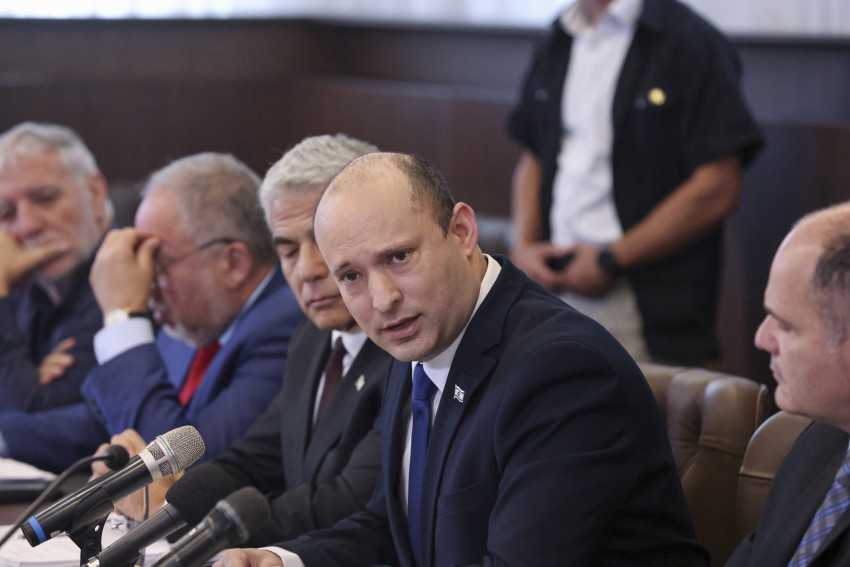Israeli PM: World powers must awaken on Iran nuclear deal
21 June, 2021

Israel's new Prime Minister Naftali Bennett opened his first cabinet meeting on Sunday by slamming Iran's newly-elected president and contacting world powers to “awaken” to the perils of time for a nuclear agreement with Tehran.
Later in your day, Bennett warned Gaza's militant Hamas rulers that Israel wouldn't normally tolerate even minor attacks from the territory in the wake of last month's 11-day war, saying “our patience is running out.” But Israel also said it would allow limited agricultural exports from Gaza for the first time because the war was halted by an informal cease-fire.
Iran’s hard-line judiciary chief, Ebrahim Raisi, was elected Saturday with 62% of the vote amid historically low turnout. He's sanctioned by the U.S. in part over his involvement in the mass execution of thousands of political prisoners in 1988, towards the end of the Iran-Iraq war. Raisi hasn't commented specifically on the event.
At the cabinet meeting in Jerusalem, Bennett said Iran's Supreme Leader Ayatollah Ali Khamenei had chosen the “hangman of Tehran” to be the country's next president, a guy "infamous among Iranians and across the world for leading the death committees that executed a large number of innocent Iranian citizens through the entire years.”
Raisi's ascendancy comes at a sensitive time for the region, as Iran and world powers crank up efforts to resurrect Tehran’s tattered 2015 nuclear deal, which granted Iran sanctions relief in trade for curbs on its nuclear program.
For weeks, Iranian and American diplomats have been negotiating a go back to the accord in Vienna through European intermediaries. Talks resumed Sunday, the first round since the election that put hard-liners firmly in charge across Iran’s government.
Israel was staunchly opposed to the landmark nuclear deal and welcomed then-President Donald Trump's decision to unilaterally withdraw the U.S. from it. Since that time, the agreement has unraveled, with Iran abandoning all its limitations on enrichment following the Trump administration restored crippling monetary sanctions. Tehran happens to be enriching uranium at its highest levels ever, though still short of weapons-grade levels.
Although the White House has yet to weigh in on Iran's election, President Joe Biden’s national security adviser, Jake Sullivan, said on Sunday that the outcome was unlikely to affect nuclear negotiations because Iran's supreme leader wants the offer restored.
“The individual who makes your choice about whether Iran will return back in to the Iran nuclear deal, will assume its nuclear obligations under international law, is not the president of Iran, it's the supreme leader of Iran, and see your face did not differ from before the election,” Sullivan said on CNN’s “State of the Union.”
Bennett said Raisi's election was “the last chance for the world powers to awaken before time for the nuclear agreement also to understand who they’re doing business with. This business are murderers, mass murderers."
Israel, which is thought to have its undeclared nuclear arsenal, has long opposed arch-enemy Iran's nuclear program and has vowed to avoid Tehran from obtaining nuclear weapons. Iran insists its nuclear program is supposed for peaceful purposes.
Earlier this month, Israel's outgoing Mossad intelligence chief signaled that Israel was behind a string of recent attacks targeting the country’s nuclear program.
Bennett heads a broad coalition of parties ranging from hard-line Jewish nationalists to liberal factions and a small Islamist party. His government was sworn in the other day, sending Benjamin Netanyahu to the opposition after an archive 12 years as prime minister.
Down the road Sunday, at a memorial ceremony for Israelis killed in the 2014 Gaza war, Bennett warned Hamas that Israel “won't tolerate violence, we won't tolerate a drizzle.”
He were discussing incendiary balloons launched from Gaza in recent days that contain set fields ablaze inside Israel. Last week, Israel launched airstrikes on two occasions in response to the balloons sent by activists mobilized by Hamas.
Last month's Gaza war was halted by a casual cease-fire. Egyptian mediators have met with Israeli and Hamas officials in recent weeks to shore it up. Hamas is demanding the lifting of an Israeli-Egyptian blockade imposed on the territory when it seized power from rival Palestinian forces in 2007.
Israel says the blockade is required to keep Hamas from importing military resources, while the Palestinians and human rights groups notice as collective punishment of the territory's a lot more than 2 million Palestinian residents.
COGAT, the Israeli military body that oversees civilian affairs in Gaza, said that starting Monday it could permit the “limited export of agricultural produce” from Gaza for the first time because the war ended.
Source: japantoday.com
